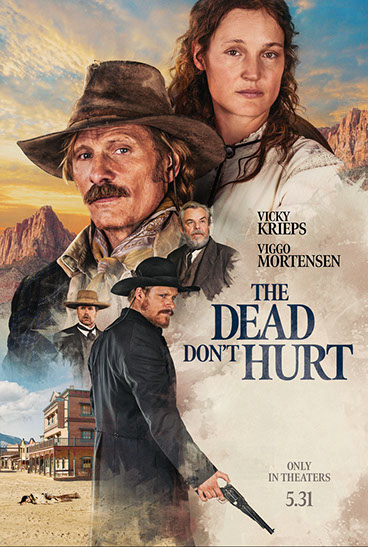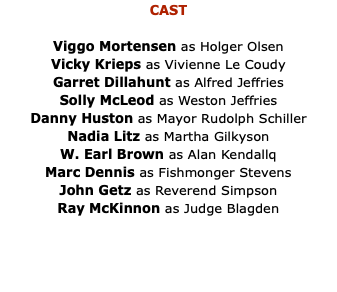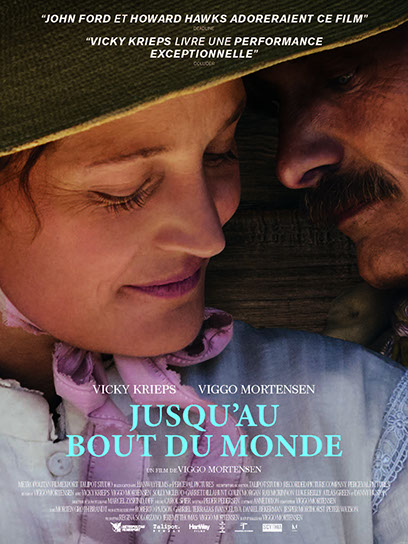THE DEAD DON'T HURT

THE DEAD DON'T HURT
SYNOPSIS
Set in the 1860s, Viggo Mortensen’s second outing as writer-director (after Falling, TIFF ’20) is an elegantly realized feminist western starring Mortensen himself and Vicky Krieps as immigrants attempting to forge a life in a corrupt Nevada town.
French-Canadian flower seller Vivienne Le Coudy (Krieps) and Danish carpenter Holger Olsen (Mortensen) meet in San Francisco. Vivienne is irreverent, fiercely independent, and refuses to wed, but agrees to travel with Holger to his home near the quiet town of Elk Flats, Nevada. There, they begin a life together — Vivienne grows roses and waits tables at a tavern and Holger builds barns, until the couple are separated by Holger’s decision to fight for the Union in the burgeoning Civil War. Left on her own, Vivienne must fend for herself in a place controlled by corrupt Mayor Rudolph Schiller (Danny Huston) and his business partner, powerful rancher Alfred Jeffries (Garret Dillahunt). Alfred's violent, wayward son Weston (Solly McLeod) aggressively pursues Vivienne, who is determined to resist his unwanted advances.
The Dead Don’t Hurt slides between points in time, beginning near what is, in fact, the story’s chronological end. Thus, when we see Weston’s brutal encounter with Vivienne, we already know what violence he’s capable of. The brilliance of Mortensen’s narrative structure is that it frontloads the lawlessness and mayhem we expect from a western, then gradually introduces the tenderness and moral integrity that give this film its true raison d’être. Framed in a style that emphasizes the relationship between character and landscape, and infused with multiple exquisite performances, this is a portrait of a passionate woman determined to stand up for herself in an unforgiving world dominated by ruthless men.
—CAMERON BAILEY (TIFF)

Viggo Mortensen Directs and Stars in First Trailer for Ruthless Western The Dead Don't Hurt
Viggo Mortensen is putting his spin on the American Western with his new movie.
The Dead Don’t Hurt features the star as actor, writer and director. PEOPLE has the exclusive first look at the trailer, which offers glimpses of this 1860s-set tale of star-crossed lovers, corrupt lawmen, violent outlaws and revenge.
Vicky Krieps (Phantom Thread) leads the cast, which also includes Solly McLeod, Garret Dillahunt, Colin Morgan, Ray McKinnon, W. Earl Brown, Atlas Green and Danny Huston.
Mortensen, 65, calls The Dead Don’t Hurt a "dramatic and emotionally engaging story about a uniquely independent woman on the western frontier, and her relationship to the headstrong man she chooses to share her life with.”
The director tells PEOPLE, “My hope is that audiences will feel they are stepping back in time to the wild landscapes and lawless society of the Far West in the 1860s, and that they’ll be entertained by a movie in the tradition of the best classic Westerns.”
Krieps plays Vivienne Le Coudy, a woman who joins Mortensen’s Holger Olsen, a Danish immigrant living in a remote town in Nevada. After he leaves to fight for the Union in the American Civil War, Vivienne must fend off violent neighbors — “an unforgiving world dominated by ruthless men,” per a synopsis.
“Both a tragic love story and a nuanced depiction of the conflict between revenge and forgiveness, The Dead Don’t Hurt is a portrait of a passionate woman determined to stand up for herself,” the synopsis adds.
“I’ve never sensed a false moment, an untruthful or superficial line reading or gesture in any role I’ve seen her play,” Mortensen says of costar Krieps, 40. “Her performance turned out to be even more layered and moving than I'd hoped it might be.”
The Dead Don’t Hurt review – love blossoms amid violence
in Viggo Mortensen’s western
Peter Bradshaw © The Guardian
9 Sep 2023
This sinewy, sombre, handsomely crafted and beautifully shot western is Viggo Mortensen’s second feature as a director, an impressively authored movie in which Mortensen is also writer, composer and star. With almost anyone else, this might be the recipe for narcissism, and yet that self-effacing and even reticent quality in Mortensen’s screen presence works against that danger. He is, however, certainly working within the traditional strong, silent template of the old-school western hero.
Holger Olsen (played by Mortensen) is a Danish immigrant to the prewar United States of the 1860s, who finds himself in San Francisco – a carpenter, rough-hewn outdoorsman and military veteran. He finds himself meeting the frank, unabashed gaze of Vivienne Le Coudy (Vicky Krieps) a French-Canadian woman of modest means but independent temperament, who has just broken off an understanding with a wealthy but obnoxious man (Colin Morgan).
Olsen and Vivienne move in together in Olsen’s shack just outside a distant frontier town, and Vivienne is soon going to give birth to a son. But before their family responsibilities arise, Vivienne finds herself a job in the town’s saloon bar, where she comes into fateful contact with the town’s weaselly mayor, Rudolph Schiller (soft-spoken Danny Huston). Schiller is complicit in the unlawful affairs of the town’s crooked land baron, Alfred Jeffries (Garret Dillahunt), and always ready to turn a blind eye to the behaviour of Jeffries’s psychotically violent son, Weston (Solly McLeod). As the civil war approaches, the tensions within this frontier community come to the surface.
Laid out like this, these story ingredients may seem obvious. And yet Mortensen, working with editor Peder Pedersen, remixes them into a structure of flashback/flashforward which is intriguing, makes for a delayed revelation and certainly endows Vivienne throughout with a tragic and poignant dimension. But it takes some time to get used to, particularly at the beginning, which brings us from the end of Olsen and Vivienne’s life together, back to the circumstances of their first meeting and then even back to Vivienne’s own girlhood.
It is in these childhood sequences that we see Vivienne’s own fantasy reveries about the heroism of Joan of Arc, and the all too real brutal execution of Jeanne’s father by the British redcoats. Mortensen coolly juxtaposes this execution, in the present day, with the wrongful execution of the town’s poor innocent soul, Ed Wilkins (Alex Breaux), an injustice connived at by the mayor. It is also hints at a Freudian link in Vivienne’s mind between Olsen and Vivienne’s father.
It is a world of cynicism and violence and bad faith, in which Olsen and Vivienne’s love blooms like a miraculous flower – and Vivienne, who was formerly employed as a florist in the big city, wants to make the rough soil around Olsen’s shack bloom with flowers. Krieps and Mortensen’s rapport is just right: romantic, besotted with each other and yet tough and without illusion.
Mortensen creates a lovely touch for his character (perhaps improvised) when they visit an art exhibition hosted by her soon to be-ex-fiance. Olsen, though no pampered art lover, reaches out to one painting that is incorrectly hung and, with a touch on the frame, puts it straight. Clearly, the carpenter in him will not permit this object to hang out of alignment: he has a craftsman’s exacting sense of what is and is not right, which the pampered city slickers and art lovers do not.
Violence and tragedy is where the story is naturally heading, and this trajectory is plain in every scene and every shot: a world where aggression must either be violently and dangerously resisted or accepted. The title comes from a plaintive question from their little boy, Vincent (Atlas Green), who wonders if the bird that Olsen has just shot is in pain. Olsen tells him no – but this film seems populated by dead people who are in quite as much pain as the living, and the film’s plangent ending does nothing to take the pain away.

.jpg)
‘The Dead Don’t Hurt’ Review: Viggo Mortensen Stars, Writes, Directs, Produces & Composes Music For Uniquely Fine Western, But Vicky Krieps Is Its Soul – Toronto Film Festival
By Pete Hammond @Deadline
September 8, 2023
The western genre has been so pervasive throughout the entire history of the movies, and it is hard to imagine doing anything in it that hasn’t already been done. Viggo Mortensen, in writing, directing, producing and co-starring in only his second film behind the camera (after 2020’s Falling) finds a moving, if tragic, love story to play against the stunning landscape of the circa-1860s West, and somehow it all feels new. John Ford and Howard Hawks would love this movie.
The Dead Don’t Hurt is a title that promises something else, but without giving away spoilers, it ultimately feels right for this story of Holder Olsen (Mortensen), a Danish immigrant who falls hard for Vivienne Le Coudy (a luminous Vicky Krieps), who he meets in San Francisco. Wanting some quiet peace in his life, they move together to Elk Flats, Nevada, and start what appears to be an idyllic life together. That is, until the ex-soldier up and decides to join the Union Army to fight the Civil War.
The spotlight then shifts to Vivienne, who gets a job at the saloon and learns to make her way in what turns out to be an outlaw town run by the corrupt Mayor Rudolph Schiller (a slippery Danny Huston), who is in cahoots with an equally corrupt major landowner, Alfred Jeffries (Garrett Dillahunt). Trouble arises when Jeffries’ no-good son, Weston (Solly McLeod), attempts to woo Vivienne, who wants no part of this bad boy. Things get dark from there as Weston shows his true colors and rapes her. She, however, is not a victim but a woman who gains some survival skills just to deal with these bad guys. When Holder finally returns after five long years, their relationship faces new challenges that threaten to tear them apart, and he might not be ready to deal with a life-changing discovery.
I had heard this described as a “feminist western,” but I can’t say that is the right description. Mortensen, with the immense help of his female lead, has made a truly moving love story about two people who don’t use many words to describe it but clearly are deeply in love just as life threatens the life they had planned together. The dead may not hurt, but for those still living, there can be a whole lot of hurt.
Mortensen has placed his story squarely in the western genre, but you really could lift it out and put it in many different settings and still have the same very human character study that stays with you long after credits roll. Luxembourg-born Krieps (Corsage) is so authentic in the lead role that she looks like she came from one of those faded old photos taken at the time. She is an almost chameleon-like actor who disappears into whatever role she plays, and it is no different here. Mortensen gives her the spotlight as he retreats from the middle of the picture, but his quiet strength is powerful to watch whenever he is onscreen.
Among the supporting cast that also includes such veterans as Huston, Ray McKinnon and W. Earl Brown, plus Colin Morgan and Atlas Green, it is McLeod who stands out just for his pure villainy. He might not reach the blood-curdling levels of Henry Fonda Welcome to Hard Times evil, but he is bad enough and makes us really hate him.
Production values are superb, with beautiful cinematography from Marcel Zyskind (who also shot Falling) making the most of the Durango, Mexico, locations where many a classic rode before. As if he already didn’t have enough to do, the multi-talented Mortensen also composed the fine musical score.
Producers with Mortensen are Regina Solorzano and Jeremy Thomas.
